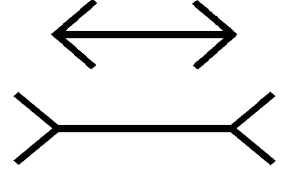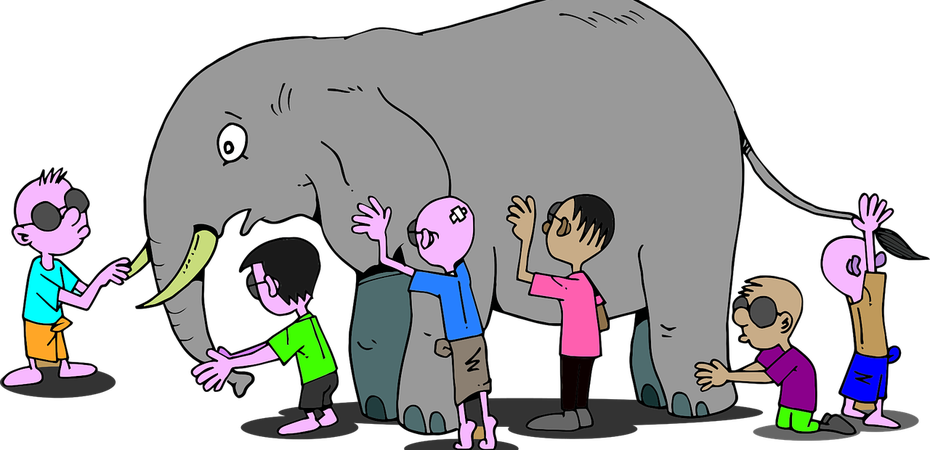I started writing the first part of this series that was meant to kill the intellectual in me. I even completed more than 1000 words of it along with images. Then I junked the whole thing!
Something did not feel right with what I had written. Just before I was about to edit the piece, I stopped and closed my laptop. I realized that the whole thing that I had written was an entire piece of rationalization. The article was well structured and detailed using the entire power of logic and proof to show everyone how the 5 senses are insufficient for us to be able to perceive the world in absolute objectivity. It had visual illusions, examples of auditory misperceptions, a list of the different kinds of biases that we make cognitively, studies that show how impressionable we are without even realizing it and more.
As kids, many of us may have read about the Muller-Lyer illusion (if you Google it, you will have that moment of aah, I have seen this before). We come across cognitive biases every day. Post-purchase rationalizations, anchoring ourselves to a number in a negotiation, sticking to our beliefs even in the wake of strong arguments against the belief, and making excuses that can be shattered in no second by another who is not emotionally attached to the event.
Limitations of the Physical Senses

Despite knowing that some images are illusions, we fail to see them. For instance, in the Muller-Lyer example, try as you may, every time you look at those two lines, you almost always see one line as longer than the other even when you know that they are the same length. This is the level to which our vision is limited.
Even without the assistance of this example, we know that our eyesight is fairly limited. For example, when we look at another person, we only see a limited aspect of the other person. We cannot see what they are from behind, we cannot see their internal organs and the underlying layers that make them and we cannot see the individual as part of the overall familial, social, and environmental construct that they are a part of.
It is therefore pertinent that we realize the level to which we are oblivious of the world around us. This is the most basic of all arguments that tell us that we should not rely too much on the manner in which we perceive the world. There is much more to the manner in which we perceive things around us.
Cognitive Limitations
There are so many things happening around us at a given point in time. The capacity of our brain is not such that it can consciously perceive or process all the stimulus that is being presented. Therefore, we select. The manner in which we select is so subjective and complicated that it is almost impossible to detail or put down as an algorithm. The best way to understand it is that we perceive and process things that are important to us in order to achieve a goal. The goal can be whatever we decide, though! So, when I want to focus on writing this article, I can block out and eventually not even hear the sound of the music playing in the background. For an experiment that was done in this area, watch this video.
What we choose to perceive can be extremely difficult to understand overall. Things that can make us feel uncomfortable or aspects that we are not ready to accept can easily be ignored even when they are staring at us in the eye. This is why someone not emotionally attached to an event can perceive things relatively more objectively.
Those mesmerized by the manner in which our minds deceive us, read The Art of Thinking Clearly by Rolf Dobelli. The list of cognitive biases itself is daunting and gives us a peek into how limited we are.
Be Brave to See That You Cannot See…You Do Not Know!
The crux of this part of ‘Killing the Intellectual’ is that at the most basic of levels, we do not know! Seeing is not really believing. My task for killing the intellectual in me is to practice this:
The next time someone contradicts me, I am going to ensure that I do not argue back. I am going to try and remember that what I saw is not absolute. There are various ways of perceiving something. I am sure it will be extremely helpful in an argument with a spouse or a child when I am trying to prove that I saw them do something or I ‘know’ that they did something.
Every time someone challenges me, I am going to remind myself to save myself the trouble of trying to convince them otherwise. Because my seeing something ‘with my own eyes’ does not prove anything at all! It will help me become a humbler human being.
As I go down this journey, I sometimes feel that the cognitive revolution (the one that differentiated us from animals into thinking and imagining beings) is probably the cause of the state humans are in today. But more on this towards the end of the series!
To continue reading about this journey, click here!


By far the best you have written so far